Best Tips for Startups to Win in the Age of AI Search Engine Marketing
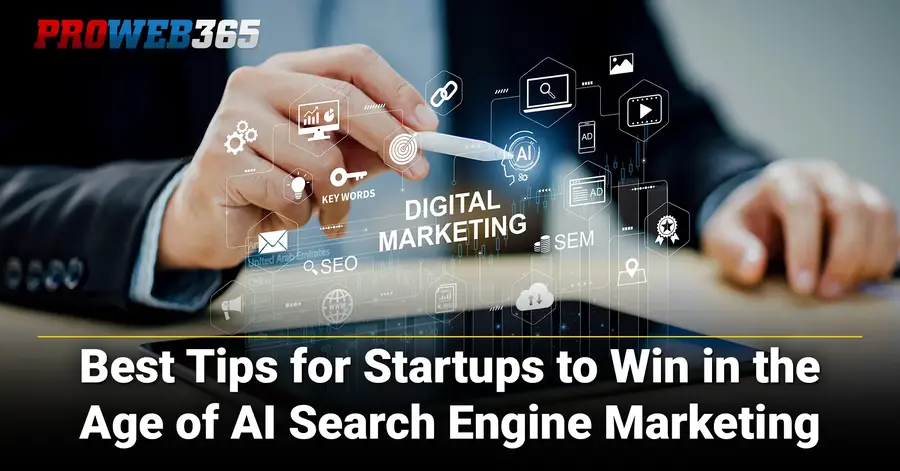
The digital marketplace is constantly improving, with tech advancements and shifting consumer behaviors being the driving forces behind it. Businesses that fail to adapt their marketing strategies are left behind and forced to claw their way back to relevancy. This is especially true in search engine marketing, where Artificial Intelligence (AI) is ushering in a transformative era.
AI's influence in search has been monumental, with 84% of search queries now influenced by AI-generated results. For startups, this represents a fundamental shift demanding proactive engagement. Studies indicate that those effectively leveraging this technology are twice as likely to succeed.
The Paradigm Shift: From Keywords to Intent and Beyond
Historically, SEO relied heavily on precise keyword matching. AI has reshaped this approach, extending now to understanding nuanced meaning and answering questions asked in normal conversation.
Google's AI algorithms prioritize the underlying intent behind user queries. Successful SEO must now create genuinely useful content that directly addresses user questions.
Key Takeaways
- Embrace AI, Don't Fear It: AI is reshaping the way we think about search, making it more intuitive and personalized. Startups leveraging AI are twice as likely to succeed, making adaptation crucial for survival and growth.
- Shift from Keywords to Intent: Modern AI-powered search prioritizes understanding user intent and natural language over exact keyword matches. Content must provide direct, valuable answers to user questions.
- E-E-A-T is Your North Star: Experience, Expertise, Authoritativeness, and Trustworthiness (E-E-A-T) are paramount. AI algorithms use these signals to determine content credibility and relevance, making them crucial for ranking and citation.
- Foundational SEO Still Matters: Technical SEO, site speed, mobile-friendliness, structured data, and quality backlinks still have a place in today’s digital world. These elements ensure that AI crawlers can efficiently access, understand, and trust your content.
- Optimize Your Google Business Profile (GBP): For local businesses, an actively managed GBP is a direct feed to AI systems, improving local search visibility and trustworthiness.
- Create "Answer-First" Content: Design content to provide direct, concise answers to common questions, especially for AI Overviews and featured snippets. Focus on the "messy middle" of the buyer journey with in-depth, original insights.
- Leverage AI Tools Strategically: Utilize AI for efficiency in content creation, keyword research, technical audits, and competitive analysis. However, always maintain human oversight to allow for authenticity, a unique brand voice, and ethical compliance.
- Prioritize Trust and Transparency: Real reviews, community engagement, and clear communication build trust with both human users and AI algorithms, enhancing your authority and making what is pushed live more likely to be cited.
1. Understanding the AI-Powered Search Landscape
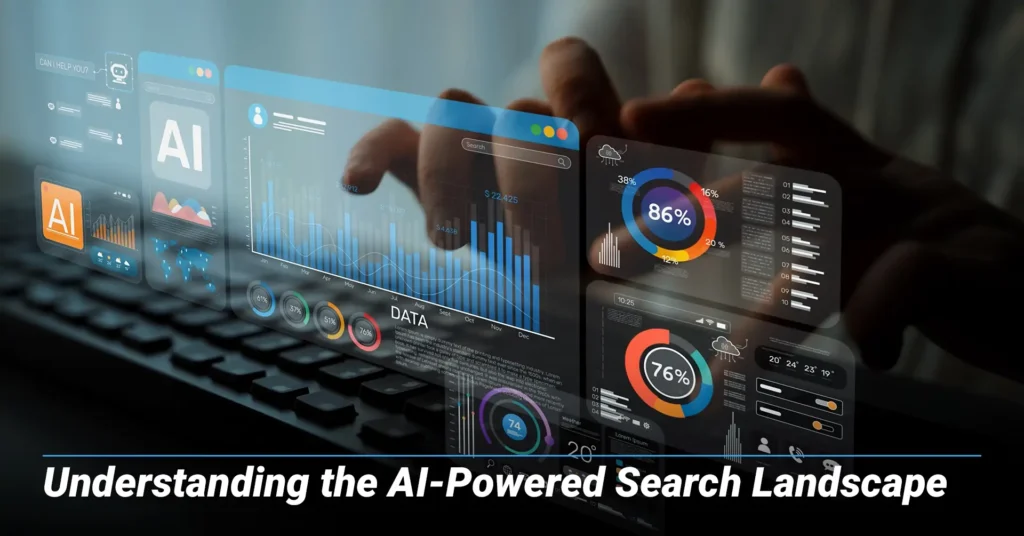
A. The Core AI Algorithms Driving Modern Search
- RankBrain (2015) uses machine learning to understand user search intent, interpreting ambiguous queries without exact keyword matches.
- BERT (2018) revolutionized natural language understanding by analyzing words in context, accurately interpreting conversational queries.
- SGE (Search Generative Experience) offers instant, summarized answers as "AI Overviews," reducing the need for multiple clicks.
- MUM (Multitask Unified Model) understands and generates language across different modalities (text, images, video) and languages.
This evolution shows AI's shift from quick baseline answers to intelligent assistants. For startups, the rise of AI Overviews signals a move from users "finding" links to "knowing" answers directly.
B. How AI Personalizes Search Results
AI transforms how search engines personalize results through machine learning algorithms. User data, search history, and behavior patterns are a few variables taken into consideration before a clear and concise answer is provided. This creates opportunities for hyper-targeted marketing. Startups must understand where to meet as a niche for their audience's needs, pushing toward highly specialized contentand intensified local SEO.
C. The Rise of "Zero-Click" Outcomes
AI-driven systems directly answer questions within search results, reducing the need to click links. Studies indicate 75% of Google queries now result in no clicks.
This phenomenon showcases traditional organic traffic metrics no longer being the sole success indicator. Being cited, summarized, or mentioned in AI overviews is today's new measure of visibility.
D. Why E-E-A-T is Paramount
E-E-A-T (Experience, Expertise, Authoritativeness, Trustworthiness) serves as a crucial quality filter for AI to determine source credibility. A startup's ability to demonstrate E-E-A-T becomes the best way for search engines to select and prioritize content.
Table 1: Key AI Search Algorithms and Their Primary Focus
|
Algorithm Name |
Introduction Year |
Primary Focus/Function |
Key Impact on SEO Strategy |
|---|---|---|---|
| RankBrain | 2015 | User Intent & Relevancy | Focus on understanding and addressing user intent in content. |
| BERT | 2018 | Natural Language Understanding (Context & Nuance) | Optimize for conversational queries and natural language; ensure content answers complex questions. |
| SGE | 2023 | Generative Answers & Summaries | Structure content for direct answers and potential AI citations; prioritize conciseness and clarity. |
| MUM | N/A | Cross-modal & Multilingual Understanding | Develop holistic content that integrates various media types; consider broader topic coverage. |
2. Foundational SEO in the Age of AI (Still Essential!)
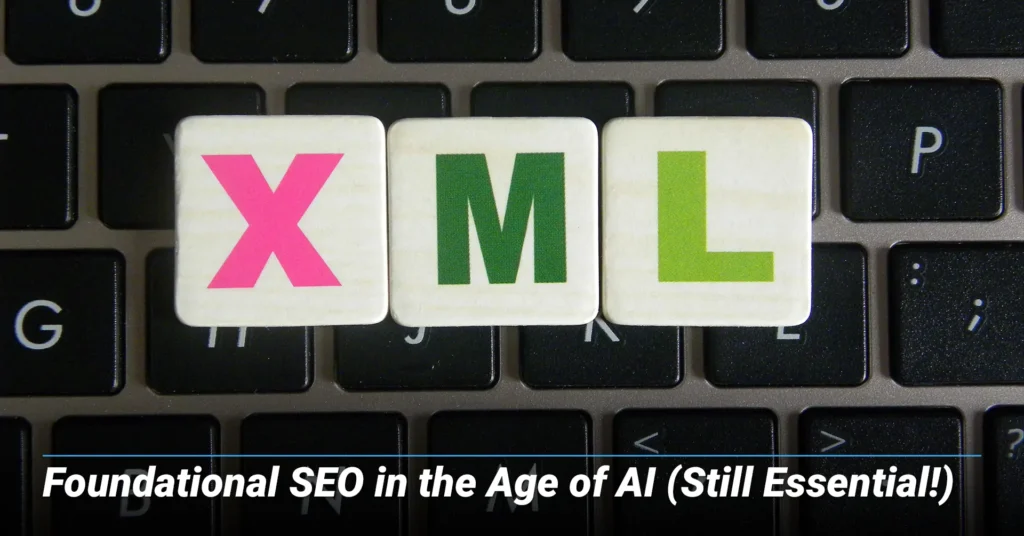
Despite not being as dominant in the search space, traditional SEO principles still hold their own in the digital marketing world. These elements enable AI algorithms to discover, understand, and trust a business’s online presence.
A. Building a Technically Sound and AI-Friendly Website
- Page Speed and Mobile-First Design: Fast, mobile-friendly websites directly facilitate AI crawlers' ability to efficiently access and process content. A slow or non-responsive website hinders its effectiveness to crawl and accurately index content.
- Schema Markup and Structured Data: Schema markup provides a machine-readable format, allowing AI algorithms to better understand content context and relationships. This gives the technology a clear "instruction manual" for categorizing and interpreting content for direct answers and AI Overviews.
- Clean Code and Site Structure: Clean code and logical structure signal professionalism and reliability to AI algorithms. This efficiency allows for better crawlability and a higher likelihood of content being recognized for search results.
B. Optimizing Your Google Business Profile
For local businesses, the Google Business Profile (GBP) should be held in high regard when it comes to local ranking factors. AI-driven search actively pulls GBP data to assess relevance and trustworthiness.
Treat your GBP as an active marketing campaign: list every relevant service category, upload high-quality photos regularly, post across digital and social media, and answer customer questions. An actively managed GBP provides the platform with fresh, accurate data that bolsters trustworthiness for local searches.
C. Quality Backlinks and Domain Authority
Backlinks from reputable sources serve as strong endorsements, signaling trustworthiness to AI algorithms. When it’s evaluating sources for generative responses, perceived authority and contextual relevance are some of the factors considered.
Effective link-building strategies include:
- Building genuine relationships with industry influencers
- Creating exceptional content that others want to reference
- Responding to media requests through platforms like Help a Reporter Out (HARO)
- Guest blogging for reputable industry publications
3. Crafting Content That Wins in AI Search
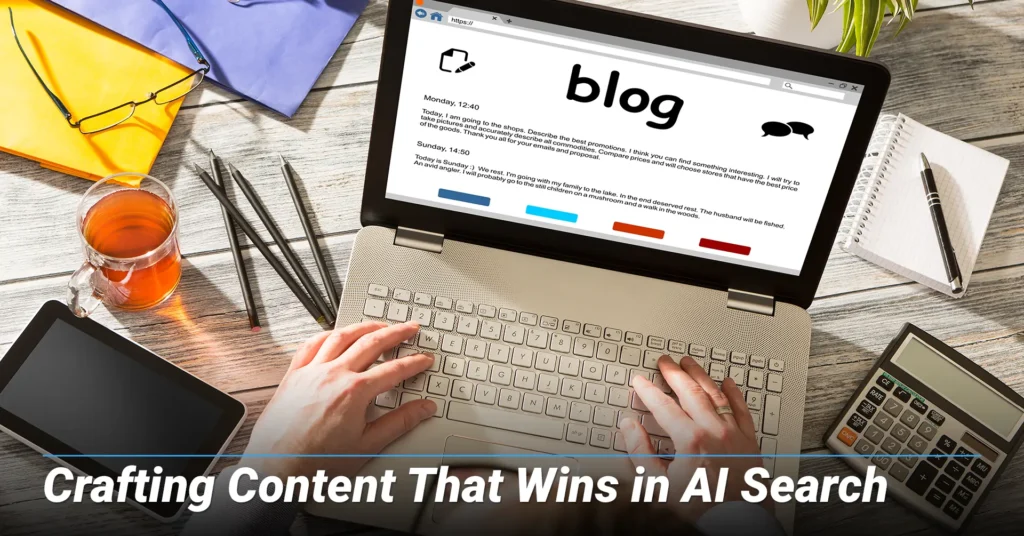
A. Embracing E-E-A-T: Building Credibility
- Demonstrating Experience and Expertise: Focus content on specific topics to establish expertise. Replace generic assets with original FAQs, geo-specific details, and testimonials from real consumers. Showcase authentic experience through real-world insights, unique case studies, and personal narratives that AI cannot replicate.
- Building Authoritativeness Through Citations: Being cited by AI overviews has become more impactful than traditional rankings. Ensure your brand appears on high-authority domains through press features and industry publications. Maintaining consistent citations on credible websites builds authoritativeness and increases the likelihood of AI feature placement.
- Fostering Trust with User-Generated Content: Real customer reviews and testimonials provide social proof that AI considers to be valuable trust signals. Maintain a positive online reputation through genuine customer feedback, which directly feeds into the software’s trustworthiness assessments.
B. Creating User-Intent Focused Content
- Answer Questions Directly: Create content that directly answers "what," "how," and "why" questions about your business. Structure content around direct, concise answers for easy AI extraction and summarization.
- Target Long-Tail Queries: Focus on conversational, specific queries that indicate higher user intent and face less competition. Create content addressing these to enhance brand recognition.
- Address the "Messy Middle": While AI handles basic questions, provide depth for complex decision-making. Detailed comparison guides and in-depth case studies that guide users through the buyer journey are some of the many examples of what to create.
C. Producing High-Quality, Original Content
- Offer Unique Perspectives: Provide insights that AI cannot generate original research, proprietary data, or unique viewpoints from real-world experience. Doing so will make it more likely to be cited as an authoritative source.
- Balance AI and Human Input: Use AI for research and drafts, but maintain human oversight for creativity, emotional resonance, and brand voice. Research shows AI-assisted content with human refinement achieves 28% higher engagement than fully generated content.
- Implement Topic Clustering: Organize content into comprehensive clusters with pillar pages and supporting content. This helps AI understand your authority breadth and creates logical internal linking paths.
D. Optimizing for AI Comprehension
- Use Clear Headings: Implement structured H1, H2, and H3 headings to AI quickly identify sections and extract information for summaries.
- Format for Readability: Keep paragraphs concise, use bullet points for key information, and include relevant visuals. Organizations that are easier for humans to read is also more ideal for AI to parse and summarize.
- Lead with Answers: Place key takeaways and direct answers early in content. This "answer-first" approach increases the likelihood of being selected for AI Overviews.
4. Leveraging AI Tools for Startup SEO Efficiency
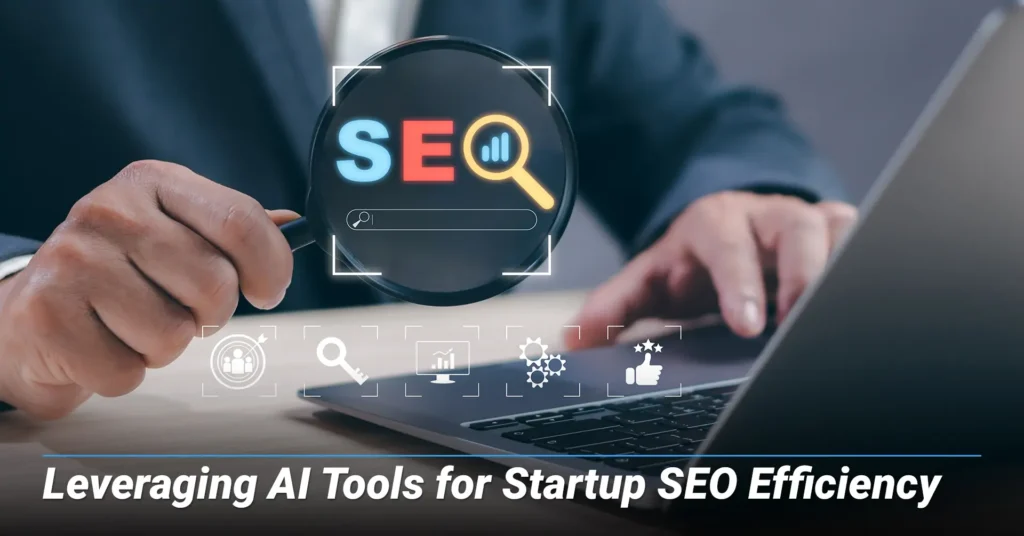
As of 2025, over 56% of marketers use generative AI in their SEO processes. These tools enable startups to scale content creation and improve outcomes by up to 25%.
A. AI for Content Creation and Optimization
Platforms including Jasper AI, Writesonic, and ContentShake AI help produce blog posts and marketing copy. Surfer SEO and Frase are a few tools that assess content quality and generate optimized briefs, easing the process for startups looking to save on operating costs.
B. AI for Keyword Research and Intent Analysis
AI-powered tools provide deeper insights into user intent beyond traditional keyword volume data. They identify patterns in search behavior and predict emerging topics, allowing startups to target beyond what their target audience has in their search history.
C. AI for Technical SEO and Monitoring
AI automates meta tag creation, schema markup implementation, and continuous website monitoring. Tools like HubSpot's SEO suggestions automatically identify areas for improvement, ensuring websites remain accessible to AI crawlers.
D. AI for Competitive Intelligence
These tools analyze competitor strategies, detect SERP trends, and identify content gaps in real-time. It changes competitive analysis from a periodic task into a continuous strategic input.
E. Balancing AI with Human Oversight
Successful AI integration uses technological advancement for efficiency while preserving the unique brand voice and strategic direction. Research shows that fully AI-generated content often underperforms, making human oversight crucial for authenticity and emotional connection.
Table 2: AI Adoption Statistics for SEO & Marketing
|
Statistic |
Data Point |
|---|---|
| Marketers using generative AI for SEO (as of 2025) | 56% |
| AI-driven SEO boost in organic traffic | 45% |
| AI-driven SEO boost in e-commerce conversions | 38% |
| Large organizations reporting SEO gains from AI | 83% |
| Small businesses leveraging AI for content/SEO | 67% |
| Time saved on content production with AI (per week) | < 5 hours |
Table 3: Recommended AI SEO Tools for Startups
| Tool Name | Primary Function/Best For | Pricing Range |
|---|---|---|
| HubSpot AI Tools | Marketing Copy & Strategy | Bundle quote |
| Surfer SEO | Content Optimization | Varies |
| Notion AI | Productivity & Content Management | $8-10/user/month |
| Jasper AI | Copywriting & Content Generation | Pro Plan $49/month |
| Writesonic | AI Chatbot & Content Creation | Basic $15/month, Professional $45/month |
| Frase | Content Briefs & AI Writing | Free trial; paid plans unlimited AI words |
| Grammarly | Content Editing | Free basic; paid premium plans |
| Chatfuel | Chatbots | Free tier available |
Conclusion: The AI revolution in search has caught up to today's society. Startups that embrace AI-powered SEO strategies while maintaining human creativity and authentic brand voice will gain significant competitive advantages. Success requires balancing technical optimization with genuine expertise, creating content that serves both AI algorithms and human needs. By implementing E-E-A-T principles, leveraging AI tools strategically, and focusing on user intent, startups can not only survive but thrive in this new search landscape.
Frequently Asked Questions (FAQ)
1. How often should startups update their content for AI search?
AI algorithms prioritize freshness and relevance. Aim for consistent updates to evergreen (always live) content and frequent new publications, as these systems hero current, verified data.
2. What role does video content play in AI search?
Video content is increasingly important as AI algorithms with MUM are able to process multiple modalities. Optimize videos with clear titles, descriptions, and transcripts for better discoverability.
3. How do startups measure AI search success beyond traditional metrics?
Focus on "AI visibility" metrics: track mentions in AI Overviews, monitor brand sentiment across these platforms, and analyze how often your content provides direct answers.
4. What's the impact of AI on paid search for startups?
AI primarily affects organic informational queries. Focus paid ads on transactional and local queries, which are less impacted by AI Overviews, and explore new ad channels for possible integration opportunities.
5. How can startups ensure data privacy when using AI tools?
Prioritize GDPR and CCPA compliance through transparent data collection, explicit user consent, robust security protocols, and selecting AI tools with strong encryption and clear retention policies.
6. What are the key ethical considerations for AI content generation?
Avoiding bias and discrimination while including human oversight, ensuring transparency, and maintaining quality standards are some of the ways to build trust in the digital age.

Phong Nguyen
Phong brings the perfect combination of business acumen and technical expertise to digital marketing. Armed with a Bachelor of Arts degree from St. Olaf College, a master’s in business administration in Marketing from the University of St. Thomas, and SEO/GEO from “The School of Hard Knocks,” Phong founded ProWeb365.com in 2009 to help Minnesota businesses and non-profit organizations succeed online.
For over 15 years, Phong and his team’s strategic approach has combined data-driven marketing with conversion-focused design, delivering measurable results that directly impact his clients’ bottom line. Are you ready to experience what innovative digital marketing can do for your business in the age of AI search engines? Contact Us today!

